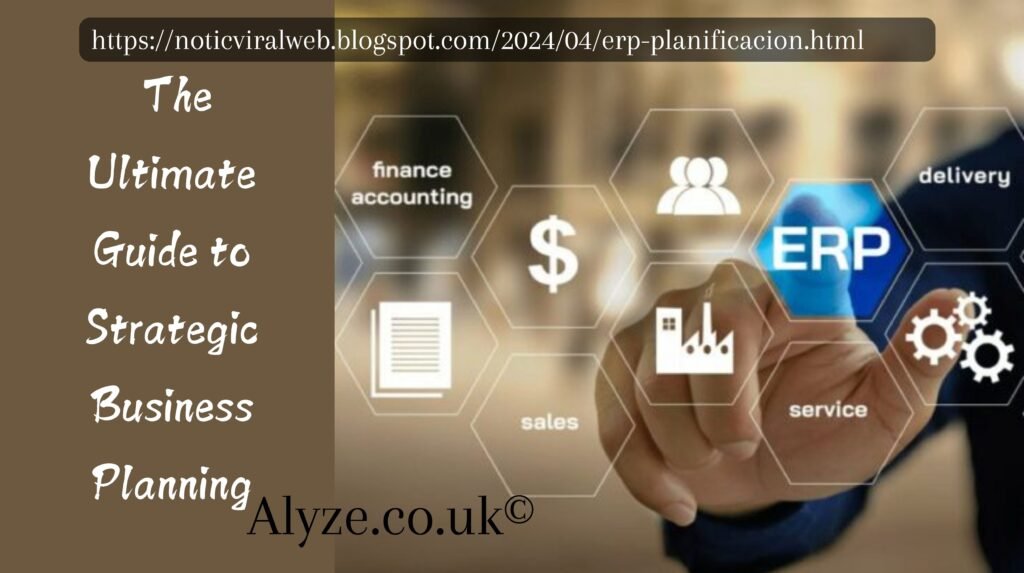Introduction
https://noticviralweb.blogspot.com/2024/04/erp-planificacion.html : ERP systems have revolutionized the face of business by bringing all the different aspects of the business processes under one platform. An ERP solution would bring much-needed relief, from a start-up company to a multi-national corporation, by bringing in line and smoothing the flow; efficiency is increased, and more insight is attained when decisions are considered. With the competition in today’s market, all companies have their eyes on the top, depending on an ERP system to help them through the way. To what extent ERP is deep-especially for strategic planning and effecting changes in a business-is what this paper shall detail.
Also Read : OSDRPG-186 : Exploring the Future of Digital Role-Playing Games
Understanding ERP
ERP is an abbreviation for Enterprise Resource Planning, some form of software system that integrates all core business processes, such as finance, human resources, supply chain, and manufacturing, into one system. Such integration comes with real-time data processing where businesses can make decisions at that very instance.
Why ERP is Vital to Businesses
https://noticviralweb.blogspot.com/2024/04/erp-planificacion.html
In this perspective, the ERP system is irreplaceable in that it binds the company’s resources, information, and processes together into one whole for easier running of daily activities and making long-term plans. This technology tears down information silos by setting up a common base on which collaboration can be encouragingly efficient in operations.
Advantages of ERP in Strategic Planning
Various data analysis, forecasting, and reporting included with ERP solutions have great relevance to strategic planning. Now let’s check some important advantages of using ERP systems for strategic planning in detail.
Availability of Real-time Data
ERP systems enable the organization to view information from all departments in real time. This real-time overview allows the management to make appropriate decisions faster and to minimize the chance of error or unwanted delay.
Smarter Finance Management: https://noticviralweb.blogspot.com/2024/04/erp-planificacion.html
ERP provides the company with a closer-to-reality look at the books, from managing cash flow to financial forecasting. Such information helps in making companies more capable of projecting budgeting, estimating revenue streams, and managing financial risks.
Ease Supply Chain Management
These ERP solutions will also enable better supply chain optimization in respect of effective inventory management, logistics management, and demand planning. This, in turn, is very helpful to the firms in reducing their overall costs, as well as enables efficiency in speed to market the product and meeting customer demands on time.
Role of ERP in Ensuring Business Growth
The ERP systems manage not only day-to-day activities of an organization but also serve as the core enabler in the attainment of business growth. This solution provides an enabling basis for long-term growth, hence giving one the tools to increase productivity, enhance data integrity, and even out operations.
Scalability for Growing Businesses
Business growth is desirable and comes with much operational added pressure. ERP systems are designed therefore to meet such growth on every count: be it in terms of growing users, adding new departments, or the volume of data handled efficiently.
Better CRM
While most ERP systems do integrate with CRM software, enabling businesses to track customer interactions and sales performances, it is this kind of integration that really allows a company to offer personalized experiences to its valuable customer base as a means of ensuring better customer satisfaction for higher profits.
How to Implement ERP: Step by Step
https://noticviralweb.blogspot.com/2024/04/erp-planificacion.html
Setting up an ERP system requires prudent planning and properly laid-out steps. The following are some key steps to implement an ERP system at your enterprise: Needs Assessment To begin with is the needs assessment-this is the right time to consider the workflow of your company and identify the pain points. This will also be included in deciding what key functionalities you need from the ERP system.
How to Choose an ERP Vendor
Selection of appropriate ERP vendor is very important because the vendor has to offer scalable solutions, options for customization, as well as industry-specific features. Besides, reviewing the support services of the vendor along with experience in ERP implementation is also highly crucial.
Customization and Integration
Once the choice of a vendor is made, the next would be to configure the ERP system to suit your needs. This is the stage where the integration of the ERP system with your existing software has to be done and the migration of the data from the previous systems should be ensured.
Training and Testing
Actually, ERP systems are somewhat tricky to use; therefore, your employees highly need proper training in how to use the system. The piloting and training sessions will help implement the system without much disruption and haste.
Go-Live and Post-implementation Review
https://noticviralweb.blogspot.com/2024/04/erp-planificacion.html
After testing is done, the ERP system is now ready to go live. But here is not where the implementation process actually stops. Actually, the system requires regular reviews and updates so that it will be able to keep up with the continuously evolving needs of the business.
Challenges of ERP Implementation
Even though ERP systems have a number of advantages, implementing them involves their own share of challenges.
High Initial Cost
High Initial Cost: The major obstacles for any company to implement ERP are its high initial cost. The buying of software, training of the staff to integration with already existing systems, it is quite expensive; especially for small companies.
Time-Consuming Process
The whole process of implementation of ERP-from conceptualization to execution-is an outright time-consuming process. Sometimes this may take months or even years depending on the size and intricacies of the enterprise .
Resistance to Change
This may be for a host of reasons such as being uncomfortable with the changed pace or the newness of the software. This may slow down the entire process and take away from productivity.
Conclusion
https://noticviralweb.blogspot.com/2024/04/erp-planificacion.html
Basically, ERP systems have become holistic in approach to the management and optimization of operations, central in strategy for modern business-from the streamlining of processes down to decision making. What ERP as a solution offers is basically a necessity for any pursuit of growth and competitiveness in today’s fast-moving global marketplace.
While ERP technology is constantly changing with time, organizations are doing their best to be at par, applying systems to meet the constant evolution of new and changing enterprise needs. Be it a small enterprise or the largest conglomerate, the right ERP solution surely propels your organization to the next level toward efficiency and success.
Conclusion: ERP is not just a tool but an investment in your company’s future, which, on the other hand, defines new directions in planning, efficiency, and scalability. See More…



